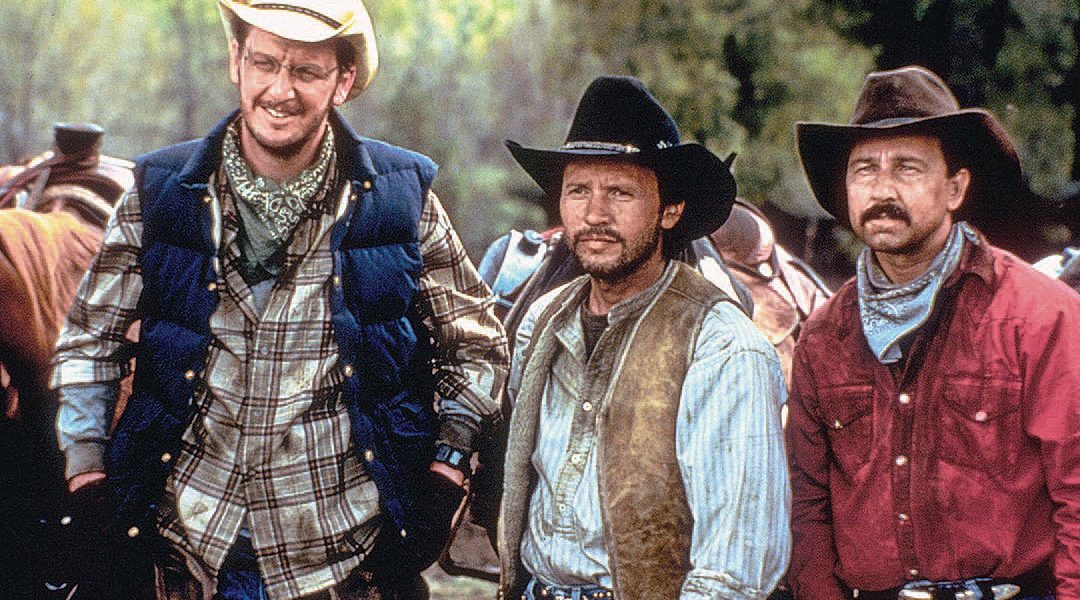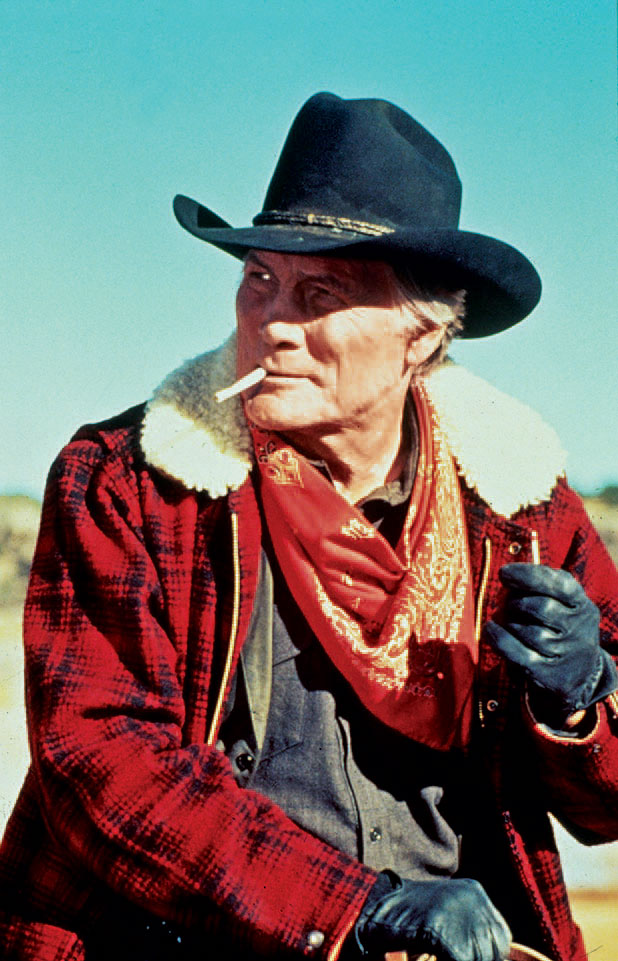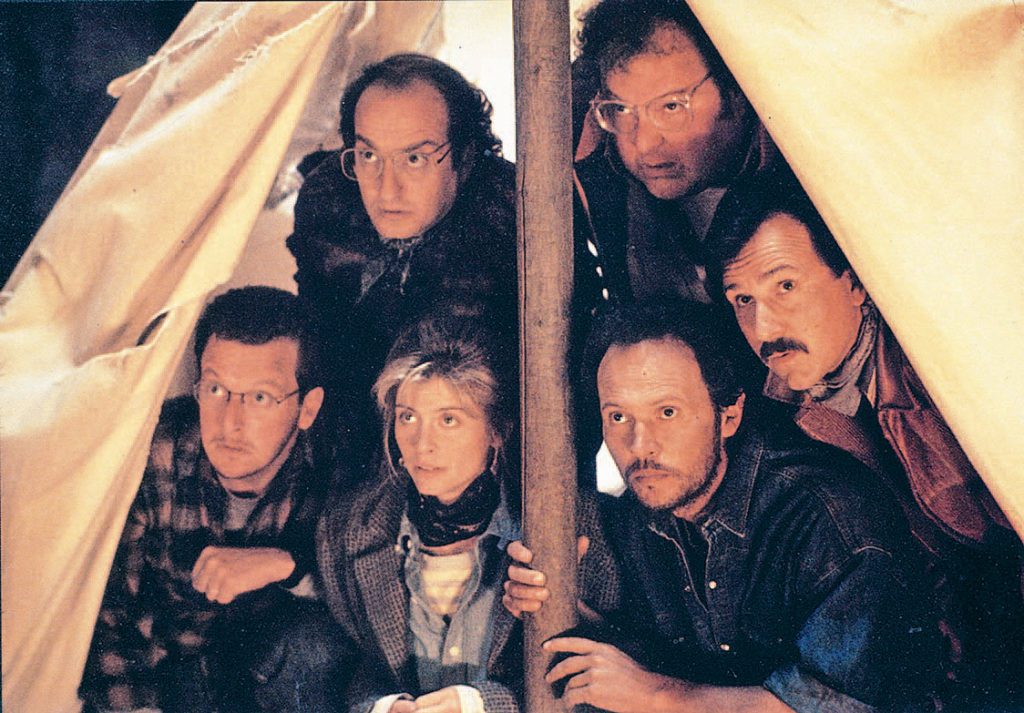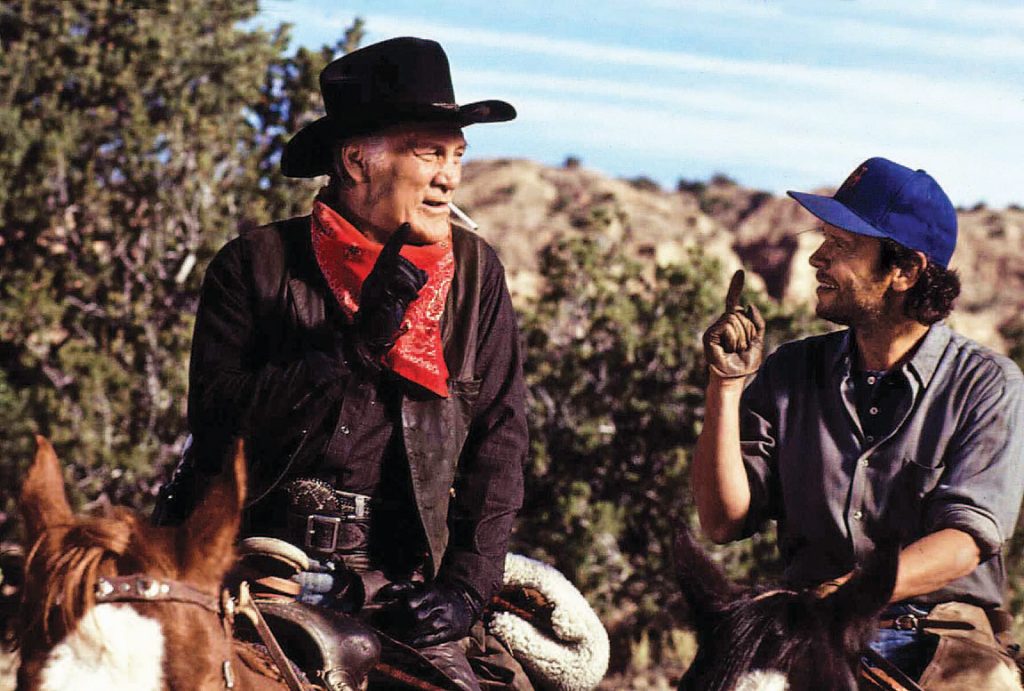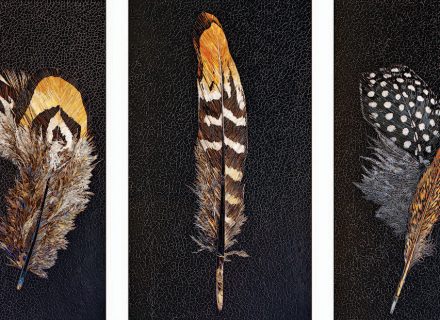We celebrate the Western comedy classic that revealed the secret of life and introduced the scariest trail boss in the West — and an endearing calf named Norman.
When Billy Crystal turned 40, he wasn’t happy about it. “I was gripped by a very cloudy mood,” he wrote in his 2013 memoir, Still Foolin’ ’Em. So he did what comedians do when faced with anxiety: He set out to find the humor beneath the heartache.
First would come his hilarious star turn as what the Los Angeles Times called “a reluctantly romantic leading man” in 1989’s When Harry Met Sally. Then he hit on a winning idea for what would become another iconic role.
“City Slickers,” he scribbled. “Three friends go on a fantasy cattle drive” — a metaphor for what was missing in their lives. “My character, like me, in his 40s ... midlife crisis.” Crystal brought the idea to his friend Rob Reiner, who had asked him to join him at Castle Rock Entertainment and had directed him in When Harry Met Sally. In 1991, City Slickers would become another huge hit for Castle Rock, grossing $180 million on a $26 million budget.
Photography: Moviestore Collection LTD/Alamy Stock Photo
Crystal played Mitch, a corporate drone dissatisfied with his life, who travels to New Mexico to experience the cowboy way with best friends Phil (Daniel Stern) and Ed (Bruno Kirby). In casting the pivotal role of Curly, the formidable trail boss, Crystal recalled the first movie he ever saw, Shane. Jack Palance, who played Jack Wilson, “the bad guy who gets it in the end,” loomed large in the film, especially in the climactic scene: Shane (Alan Ladd) calls Wilson “a low-down Yankee liar”; Wilson coolly responds, “Prove it,” and six-shooters are drawn. “Jack Palance was our only choice,” Crystal wrote. “I never forgot how scary he was.”
City Slickers would produce its own share of memorable lines. “Go and find your smile.” “Do you know what the secret of life is?” “Out there are all the answers.”
Like many of the best comedies, City Slickers had more to offer than laughs. The film takes its time getting to know the trio of friends before the story shifts to the cattle drive, so the audience is more invested in their adventures. And when Mitch and Curly head out alone to round up strays and to help birth Norman the calf, their conversation engenders wistful thoughts of sadness and joy, often in the same instant.
Such moments resonated with critics and audiences alike and resulted in a Best Supporting Actor Academy Award nomination for Palance, at a time when comedies were rarely recognized in the major categories. Crystal was hosting the Oscar telecast that year, and Palance won in the first presentation of the night. He delivered a memorable speech about the industry’s hesitancy to hire older actors — a mistake he put the lie to by dropping to the floor and doing a series of one-armed push-ups on stage. Crystal milked that moment for the rest of the show with more references to the 73-year-old Palance’s machismo: “Jack Palance just bungee jumped off the Hollywood sign.”
Photography: Castle Rock/Columbia Pictures/Ronald Grant Archive/Alamy Stock Photo
Thirty years later, the film continues to draw real city slickers west to test their cowboy skills and generate viewer discussions about the best and worst days of their lives. It also created friendships among its cast that would last a lifetime. “Billy [Crystal] delivered the eulogy at Jack’s memorial service,” recalls Jack Palance’s ex-wife, Elaine. “At one point he said when Jack gets to heaven, God will walk up and say, ‘Hi, Jack. I’m God.’ And Jack will say, ‘Prove it.’”
City Slickers was a family affair for Palance. Elaine joined him on the set for his two weeks in New Mexico, and his daughter Holly sat next to him when he won the Oscar. They shared their memories with C&I.
Elaine Palance: When Jack got the script in the mail, he said, “I don’t want to do another western.” So he didn’t read it. I went upstairs, read the script, and came down and said, “Jack, you’ll be doing this movie.”
Holly Palance: I loved it. I thought my father was fantastic. Sometimes there are moments in an actor’s performance when you see their whole career come together, and I thought those moments were all there in Curly.
Elaine: I don’t know how sincere he was about not doing westerns, but Jack was 72 when he made this movie. He didn’t ride very often, and when he did, he could tell the next day. But we went to New Mexico and had a blast.
Holly: His physicality really worked in that part. He walked slow, and there was a kind of grace in his stride. I remember an article that described him as “a tiger on a frayed leash.” I just loved that.
Elaine: Let me assure you: Jack could be very intimidating in real life. Billy and Bruno Kirby were not very tall, and I think at first Jack did intimidate them.
Photography: United Archives GMBH/Alamy Stock Photo
Holly: The combination of Billy and my dad was magical — they really liked each other. When Curly talks about the secret of life being “that one thing” and puts one finger up, and Billy says, [“Your finger?]” I think that’s why we remember it so fondly. It was philosophical. It had heart.
Elaine: My favorite scene was when Billy had to birth the calf. I thought it was brilliant the way they did it.
Holly: We had a cattle ranch — Holly Brooke — named for me and my sister Brooke. My dad loved being on that ranch. Just as in the movie, there are cows that don’t survive giving birth, and we had one stray calf named Vaca that he kept as a pet, like Norman. He would come into the house when he was small, but when he grew up he couldn’t fit through the door. My dad loved that calf.
Elaine: Who doesn’t want to be a cowboy? Dude ranches really enjoyed a resurgence after the film, because everybody wanted to go out and do what those guys did.
Holly: I went with him to the Oscars. He was so nervous because he already won the Golden Globe and thought that he could win. When his category came up, I heard him whisper, “I’m getting out of here. If I win, would you mind going up and getting it for me?” That would have been my worst nightmare! But a moment later, he won and he ran up to get it. Then I see him doing these push-ups!
Elaine: After the Oscars, everywhere we went, even as far away as Denmark, as soon as someone saw him they would shout “Jack!” and start doing one-armed push-ups.
Photography: (Cover image) Entertainment Pictures/Alamy Stock Photo
From our October 2021 issue







